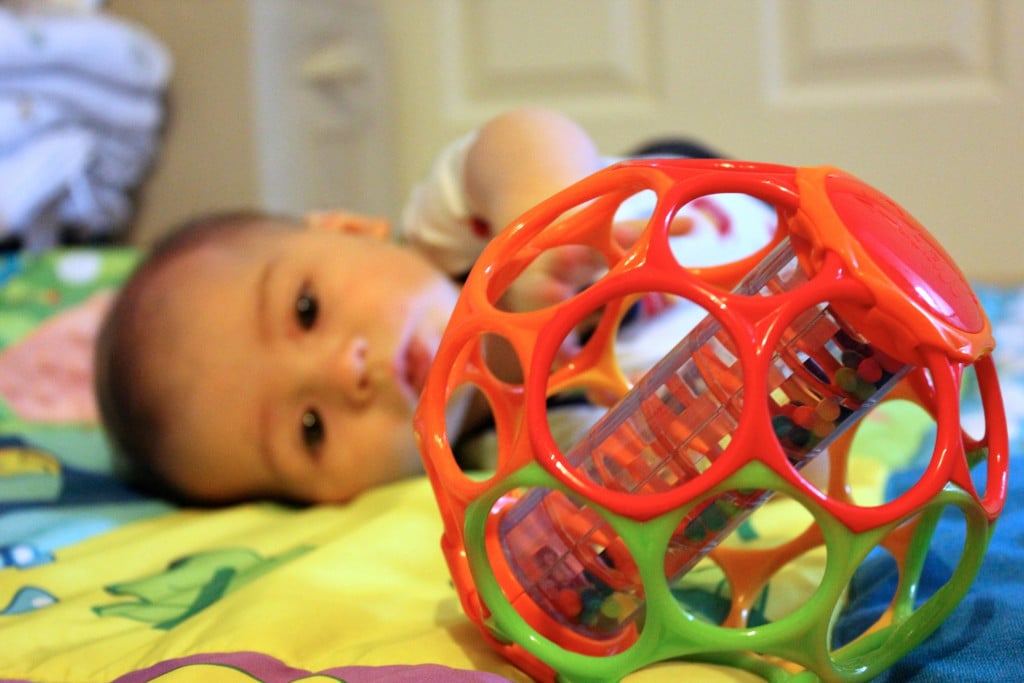When Does a Baby Play Peek a Boo
"P-east-e-k-a-a-a…" a female parent says in a calm, high-pitched tone while hiding her face… "Boo!" With that final discussion, she exposes her face and sends the child into a fit of giggles. This is a scene with which we're all familiar. Chosen "Coucou" in French, "Kakkoong" in Korean, and dozens of other cultural variations, the simple game of Peekaboo is universal.

A girl playing peekaboo (Photo Credit : Pixabay)
This game is known to engage children as young as fifty-fifty 16 weeks and works throughout the first year of evolution. Fifty-fifty infant Rhesus monkeys accept been observed to empathise peekaboo, which hints at deep evolutionary origins of this game.
Recommended Video for y'all:
What is peekaboo? The mechanics of the game
Have y'all ever tried to identify a toy in front of a very young baby and then obstructed the object with a piece of cloth? If the baby is younger than viii months, they will lose interest in the toy and neglect to search for it. A babe older than viii months, however, will typically elevator the fabric to find the toy behind it.

A baby reaching for a toy (Photograph Credit : reinasierra/twenty20)
This behavior displays much more what meets the eye. The idea that 'objects go on to be fifty-fifty if they're not visible', develops in children at around six-8 months of historic period. This skill is called "object permanence". This is not unique to humans, but can also exist observed in primates, such as Rhesus monkeys, where a similar development of the skill is observed in infancy.
Prior to this historic period, infants believe that anything that "disappears" ceases to exist. They apply this dominion non merely to objects, only likewise to people, including their mother/parent. Thus, when a mother or flagman hides from an infant, information technology creates discomfort, termed separation feet. However, this quickly disappears and is replaced by relief when the mother/parent reappears. This is the crux of the game of peekaboo.
The evolution of peekaboo with age
Very young children detect their parents play peekaboo and passively partake by smiling in response to the surprise reveal.

A parent playing peekaboo with an infant (Photo Credit : skana/twenty20)
Over time, babies learn to wait that the person will reappear in the game and discover information technology rewarding when their expectation is proven correct. As they become older, babies initiate the game themselves and demonstrate their cognition of the game by briefly hiding their face and revealing it in line with the parent's verbal response of "peekaboo". Thus, Peekaboo remains relevant throughout baby development, although the child'south contribution to the activity undergoes a major transformation as their understanding of the game improves.
So… what gives this game its universal entreatment, making it a staple of parent-child interaction across cultures? To answer this question, nosotros need to sympathize how this game works.
Peekaboo every bit a forerunner to humour
The game of peekaboo invariably makes every babe smile or laugh.

A baby laughing while playing peekaboo. (Photo Credit : envato)
Scientists have suggested that peekaboo elicits laughter considering information technology is the very first "joke" that a kid enjoys. The initial anxiety caused by the mother's disappearance is resolved by her anti-climactic reappearance. This is also the principal structure of a "joke", which elicits pleasure in humans.
Theories of sense of humor suggest that "jokes" oftentimes rely on "incongruency". In simple terms, whatsoever pleasant twist that violates our expectation or prediction is considered "funny" past humans.
For example, a man steps on a banana peel. We await the man to be gravely injured, but he simply slips and falls without any major injuries, violating our expectations. This mismatch between the actual consequence and our prediction makes it funny. Another theory suggests that events that initially look grave and later turn out to be "false alarms" are considered funny.
The disappearance of the mother during peekaboo leads the kid to look that she has ceased to exist and volition never reappear. This is violated by her surprising reappearance, which elicits laughter from the infant; the game involves both incongruence and "faux alarm," in keeping with the two theories of humor explained above.
Thus, peekaboo can be considered an early form of joking that makes babies express mirth. Laughter increases the secretion of opiates in the brain, giving us pleasure. Thus, the "humour" in peekaboo is likely what makes babies love this simple game!
Advantages of engaging a kid with peekaboo
Psychologists believe that peekaboo is extremely helpful in the healthy development of an infant. The employ of peekaboo helps infants cope with separation anxiety related to removal from their mother or parents.

A infant experiencing separation anxiety when left alone (Photo Credit : heather_lee_wilson/twenty20)
The game helps the baby learn that disappearing objects can reappear eventually, lessening feet when the mother or primary caretaker disappears from its field of view.
Conclusion
Peekaboo is one of the best methods to socialize with an infant as early every bit the non-verbal stage of development. It is universal and appeals to all infants, across varied cultures, demonstrating its deep ties to something that is mutual and central for all humans—a baby'due south early understanding of how the world works.
The pleasure of Peekaboo relies on an element of surprise associated with violating a baby's expectation of how the world functions. A babe's positive reaction to the game indicates their salubrious development of object permanence skills, which is a critical milestone of evolution!
Aid us brand this commodity ameliorate
scottdoccujjoinds.blogspot.com
Source: https://www.scienceabc.com/humans/why-do-babies-like-the-game-of-peekaboo.html
0 Response to "When Does a Baby Play Peek a Boo"
Post a Comment